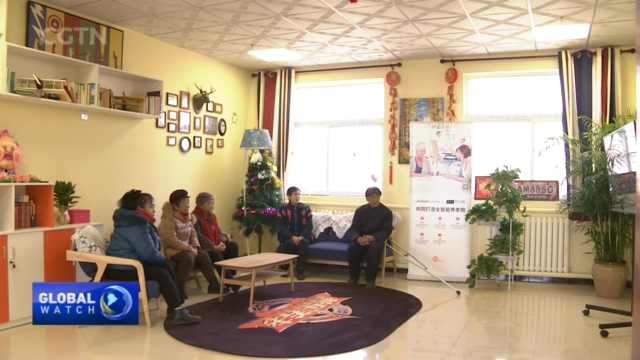
13:35, 29-Nov-2018
Artificial Intelligence: How much can the elderly stand to gain?
Updated
13:33, 02-Dec-2018
03:45

China is pushing for artificial intelligence in a big way echoing President Xi Jinping's calls to integrate AI with the economy. One promising area is elderly care. Our reporter Wei Lynn Tang looks at a nursing home in the early stages of using AI.
Wang Jinhua is almost 90 years old, but her mind is as sharp as her delivery.
Under the influence and "push" of her grandson, she is one of the first few in the Puleyuan nursing home who has started using artificial intelligence.
From switching on the TV, air conditioner, purifier -- all with just a voice command.
WEI LYNN TANG BEIJING "When we think of AI, what comes to mind? Complex algorithms, huge investments and super-smart technologies, all to make our lives more efficient. But, could the elderly be the ones who may need and stand to benefit the most from AI?"
A sense of assurance that your loved one is safe.
The sensors on this smart room's door can capture movements in and out of the room.
There is also a camera at the top of the room to monitor Wang's activities.
And Wang has access to her grandchildren, with just a touch of the button right next to her bed.
WANG JINHUA RESIDENT, PULEYUAN NURSING HOME "Isn't it good for them to see me? In the previous nursing home, there was once when I felt dizzy and fell down. The staff didn't even know till much later."
Wang is perhaps one of the more optimistic ones.
But this may not apply to all seniors. Still, Yan Shuai, who has been heading the nursing home for over 10 years, thinks resistance can be overcome.
YAN SHUAI HEAD, PULEYUAN NURSING HOME "The process of using AI is through the process of learning. It may not be convenient for us to communicate with the equipment initially, but over the longer-term, AI will slowly pick up what we want. And so I feel this is suitable for the elderly. Because it is hard to change their ways and mindset at that age, they need to be exposed to another avenue to learn, to adapt. In turn, the elderly can also keep their mind active."
And this push needs to come from the elderly's children, Yan adds.
Puleyuan nursing home marks the first smart nursing home pilot project launched by Alibaba Group last month, in collaboration with LifeSmart, an Internet-of-Things company.
Only two smart rooms use AI at the moment. Yan hopes to expand this throughout his 180-resident nursing home.
LifeSmart says its next step is to further build on smart home devices working automatically.
DAVID LIU VICE PRESIDENT OF SALES, LIFESMART "We call this AI builder, to build smart templates of your home, what are your needs? This builder can learn your pattern, to promote itself to be more fit for your living habits."
In July last year, China's State Council said it aimed to build a 1 trillion yuan AI core industry by 2030. The hope is that it will stimulate as much as 10 trillion yuan in related businesses.
And in a country where one-third of the population is expected to be over 60 by 2050, authorities are looking for ways to reduce the costs of elderly care whilst maintaining their quality of life.
And AI may just be the ticket.
WLT, CGTN, Beijing.

SITEMAP
Copyright © 2018 CGTN. Beijing ICP prepared NO.16065310-3
Copyright © 2018 CGTN. Beijing ICP prepared NO.16065310-3